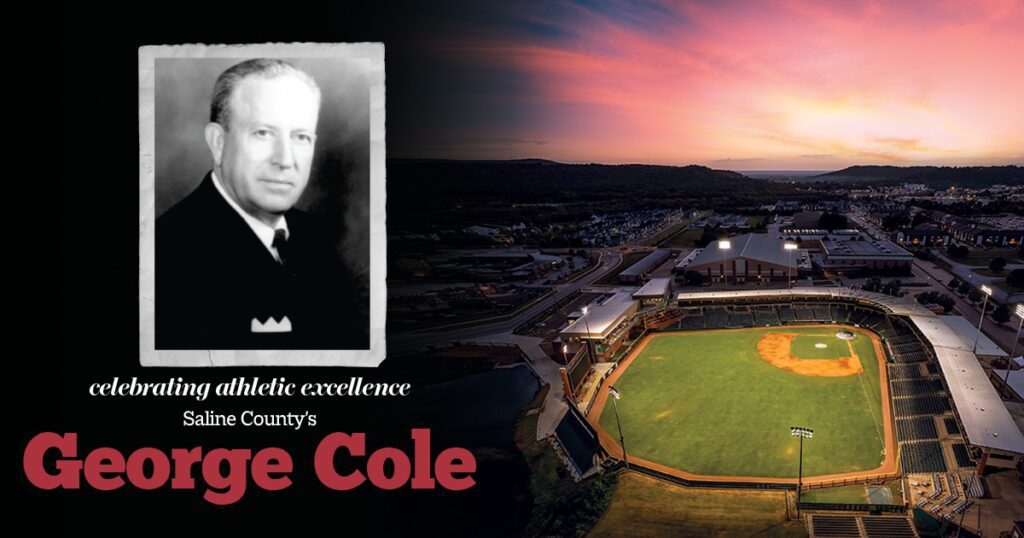31 Mar 2024 Celebrating Athletic Excellence: Saline County’s George Cole
By Dr. Robert Reising
He was distinctive. Without his initiative, competence, and versatility the University of Arkansas’s Athletic Program would not today enjoy the respect of institutional leaders across the nation. Loyally, and often inconspicuously, for forty-two years he served the flagship university in a variety of capacities, and always he mustered the cooperation and support of those to whom he was responsible. Gone since 1978, George Cole deserves to be remembered in the new millennium by all Razorback faithful.

Born on February 24, 1906, in Bauxite (Saline County), he graduated eighteen years later from the city’s high school, where he had excelled in baseball and football. Professional baseball lay as a tempting option for him, but his mind was set on different goals, and in the following fall he enrolled at the University of Arkansas (UA). Decades later, he reminded curious media professionals: “I was concerned about playing football and getting a good education.”
Baseball, however, was never far from his thoughts. He claimed three U of A varsity letters as an infielder, and upon graduation in 1928 declined a contract with the St. Louis Cardinals’ organization. His love of football retained its hold. Predictably, when he launched his coaching career, he headed a football program at Warren High School in Warren (Bradley County). The credentials he brought to that post from the UA were eye-catching. Between 1925 and 1927, he earned a place on the All-Southwest Conference team and broke the team’s single season scoring record, a mark that stood for almost four decades. During his three Razorback seasons, he tallied an impressive 185 points while registering 22 touchdowns, 32 points after touchdown and seven field goals. Clearly, he proved to be one of the most accomplished quarterbacks the University ever fielded.
Warren High School could retain him for just two seasons, and the following four campaigns, while still in his twenties, found him serving as Athletic Director and Head Football Coach at the College (now the University) of the Ozarks. In his final season at that institution, 1933—still only 27—Cole claimed six wins and a tie in nine gridiron contests, earning him a return to his beloved U of A. Except for time spent in the U. S. Navy during World War II, he was never again to serve elsewhere.

The global instability of the thirties, and especially of “the War Years,” wreaked havoc upon the U of A’s Athletic Program. Initially, in 1934, Cole coached the Freshman Team; in 1936 he moved to Assistant Varsity Coach under Fred Thomsen, and in 1942—just two weeks before the season opener—he stepped in as Head Varsity Coach for the military-inducted Thomson and persevered through a 3-7 win-loss campaign.
Cole’s own military service followed. In 1946 he returned to his alma mater as an Assistant Coach to Head Coach John Barnhill and soon established himself as one of the most capable scouts in the Southwest Conference. He served on four different coaching staffs before accepting the position of Assistant Athletic Director in 1957. Thirteen years later he succeeded Barnhill as Athletic Director, and his work continued to earn the respect not only of his predecessor but of colleagues like icons Glen Rose and Frank Broyles. Barnhill termed him in newspaper articles “the greatest detail man I have ever known”; Rose admitted that he didn’t “know where the university could have found a better person to represent its program”; and Broyles proclaimed that “no person loved the program like George did. He devoted his life to the Razorbacks.”
Accolades from outside the Athletic Department were no less effusive. Cole was elected to the Arkansas Sports Hall of Fame in 1963 and to the Collegiate Athletic Directors’ Hall of Fame in 1974, a year after his retirement from the University. The U of A baseball field was named in his honor a year later. The mention of those three significant honors encourages a reminder that the trio mirrors the many areas of sport at which Cole excelled. The athletic world as a whole appreciated that he was neither one-dimensional nor narrowly effective. He succeeded in a myriad of roles and responsibilities that fell to him in a lifetime committed to school athletics.

George Cole lived his final years in his adopted home city, Fayetteville. He enjoyed his wife and family and delighted in joking about his golfing and his fishing. He never forgot Bauxite. His native city—and the entirety of Arkansas—have every reason to reciprocate. In the words of writer Tom Mead, Cole is “A legend in the annals of Bauxite [and] Razorback sports … The spirit of George Cole will live on forever.”
- Celebrating Athletic Excellence: Lonoke County’s Eddie Hamm - September 30, 2024
- Celebrating Athletic Excellence: Conway County’s Bud Mobley - September 8, 2024
- Celebrating Athletic Excellence: Cleburne County’s Keith Cornett - July 31, 2024











